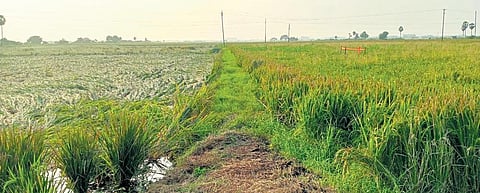

VIJAYAWADA: While standing crops on thousands of acres bore the brunt of Cyclone Michaung, crops cultivated using natural farming techniques withstood the strong winds and heavy rains. This has prompted scientists to explore the resilience of natural farming practices in the face of such extreme climatic conditions.
Speaking to TNIE, Rythu Sadhikara Samstha (RySS) executive vice-chairman T Vijay Kumar explained that fields of farmers who followed the seed-to-seed (S2S) farming technique, including the Navadhanya concept under PMDS (pre-monsoon dry sowing), were almost 100 per cent safe following the cyclone. He added that 80% of the crops cultivated in partial adherence to the natural farming protocol are secure.
“Natural farming in the State is implemented using the nine universal principles of RySS, which addresses soil conservation, ensures crop safety and nutritious yield, and enhances resistance to natural calamities.” Kumar pointed out.
Speaking to TNIE, Chenna Bhargavi, a farmer from Chemudupadu village in Kollipara Mandal of Guntur district, highlighted that the cyclone had no impact on her one-acre paddy crop that was cultivated naturally.
She said, “While crops in the adjacent fields suffered damage, our farm’s proximity to the road led curious cyclone-affected farmers to enquire about the reasons for our crop’s intact condition. MLA Annabathuni Siva Kumar and Collector M Venugopal Reddy also visited our farm to gain insights on our methods of cultivation.”
APCNF officials guiding farmers in transition to natural farming
Meanwhile, RySS officials and scientists are evaluating the cyclone’s impact on natural farming fields in Guntur, Bapatla, Eluru, East and West Godavari, Kakinada, and other districts affected by Cyclone Michaung. They interacted with farmers to note the distinctions between organic and conventional chemical farming.
RySS science team lead Zakir, an expert in natural farming, explained, “In natural farming, improved soil structure leads to porous soil, further preventing water stagnation during heavy rains. In contrast, chemical farming compacts the soil, causing water stagnation. Natural farming, which employs biostimulants like Ghana and Drava Jeevamrutham, fosters deeper and stronger root growth, reducing crop lodging.
In chemical farming, weak and underdeveloped roots result in crop lodging during heavy winds with speed of more than 100 kmph and rainfall.” Farmers credit the government, RySS, and Andhra Pradesh Community Managed Natural Farming (APCNF) officials for guiding them in their transition from chemical to natural farming.
Over the past seven years, APCNF has worked with farmers to enable their shift from conventional chemical farming to natural farming.